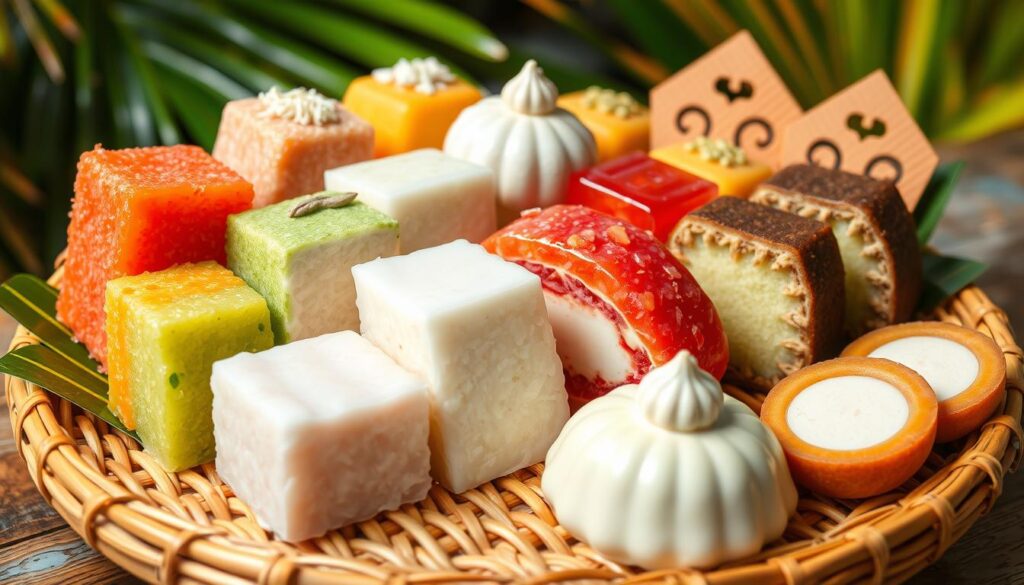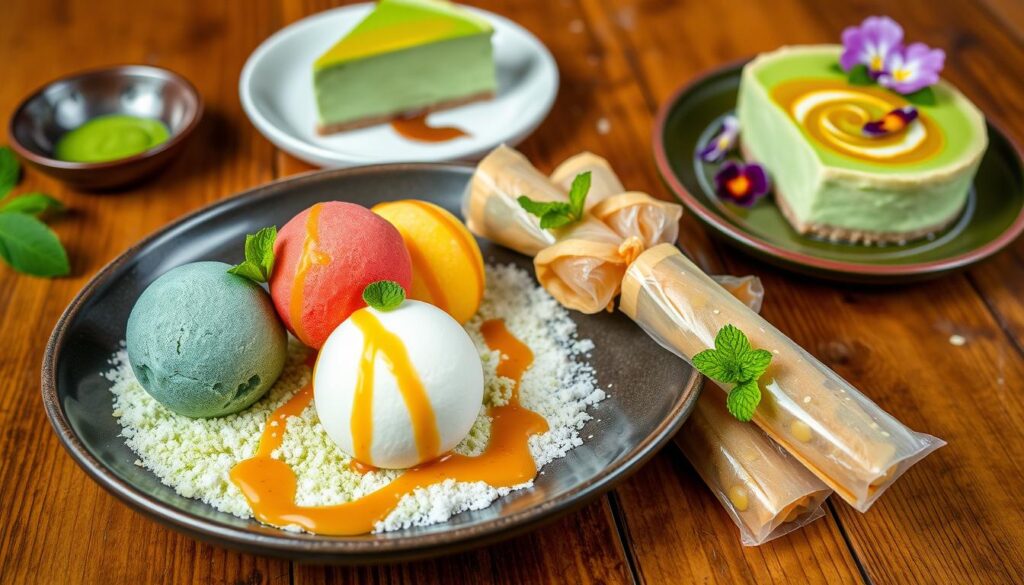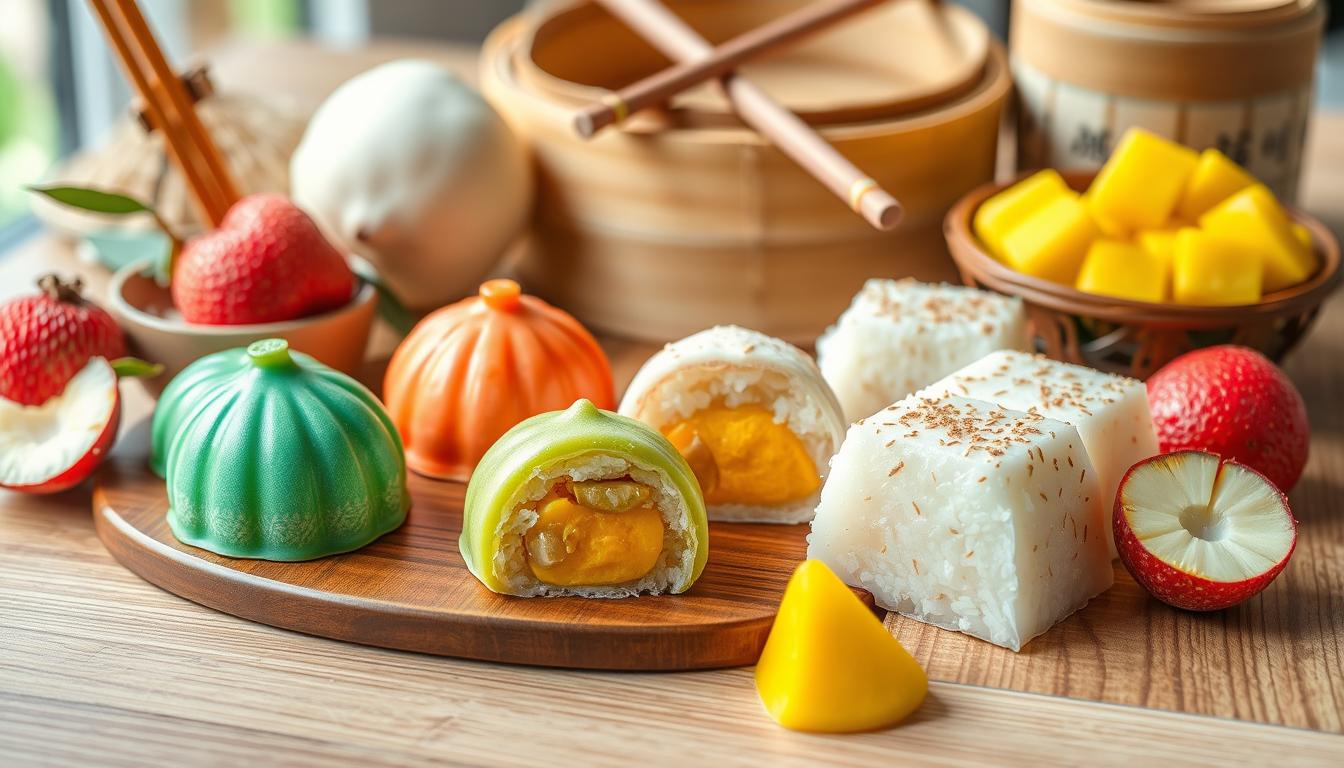As the sun sets, Tokyo’s streets fill with the scent of mochi. In Bangkok, vendors create colorful halo-halo glasses. From Indonesia’s pandan cakes to the Philippines’ ube desserts, Asian sweets offer a rich journey with exotic dessert flavors. Let’s dive into traditional and modern Asian dessert recipes, each with its own flavors and cultural stories.
Table of Contents
Key Takeaways
- Discover over 20 traditional Asian dessert recipes from countries like China, Japan, Korea, and Southeast Asia.
- Explore a range of dessert types, including cakes, puddings, ice creams, dumplings, cookies, and more.
- Learn about the unique ingredients, cooking techniques, and cultural influences that shape the flavors of these sweet treats.
- Gain inspiration to recreate the balance of sweet and savory flavors found in classic Asian desserts.
- Appreciate the artful presentation and attention to detail that makes these desserts visually stunning.
Introduction to Asian Dessert Making
Explore the world of Asian desserts and discover their unique flavors and textures. These traditional sweets offer a exotic dessert experience. Get ready for a culinary journey that will excite your taste buds and inspire your Asian-inspired dessert ideas.
Understanding Asian Dessert Characteristics
Asian desserts are known for their perfect mix of flavors, textures, and looks. They have a delicate sweetness that enhances the natural taste of ingredients. Ingredients like rice flour, coconut milk, and red bean paste give them a unique and authentic taste.
Essential Asian Dessert Ingredients
- Glutinous rice flour: A staple for creating chewy, mochi-like textures.
- Matcha powder: Imparts a vibrant green color and earthy, umami flavor.
- Agar agar: A gelatin-like thickener derived from seaweed, lending a unique jelly-like consistency.
Common Cooking Techniques
- Steaming: A gentle cooking method that preserves delicate flavors and textures.
- Frying: Adds a delightful crispness to certain traditional Asian sweets.
- No-bake methods: Showcasing the natural sweetness of ingredients without the need for baking.
Discover the rich world of exotic dessert flavors and asian-inspired dessert ideas in Asian dessert making. Enjoy the balance, textures, and traditional Asian essence that make these sweets so appealing.
Popular Japanese Sweet Treats
Explore the world of Japanese desserts and discover a delightful fusion of flavors and textures. From classic mochi to modern Japanese cheesecake, these sweet delights are a must-try for any fan of fusion dessert delights.
Start with the iconic mochi, where sticky glutinous rice is molded into bite-sized treats. Indulge in flavors like strawberry, chocolate truffle, and even matcha-infused mochi. Another beloved Japanese treat is dorayaki, consisting of sweet azuki bean paste sandwiched between fluffy honey pancakes.
For a light and airy delight, try the famous Japanese cheesecake. Known for its jiggly texture and delicate flavor, this modern treat has gained global popularity as an authentic asian bakery treat.
- Mochi: Glutinous rice-based sweets in various flavors
- Dorayaki: Sweet azuki bean paste between fluffy pancakes
- Japanese Cheesecake: Light, jiggly, and delicate in texture
Matcha-flavored desserts have also become a beloved part of the authentic asian confectionery scene. From creamy matcha lattes to delicate matcha-infused cookies, these green tea-based sweets offer a unique and refreshing twist.
No exploration of Japanese sweet treats would be complete without mentioning the traditional wagashi. These beautifully crafted confections are often served alongside a soothing cup of tea, showcasing the harmony between food and the art of tea ceremony.
| Dessert | Estimated Preparation Time |
|---|---|
| Mango Pancakes | 30 minutes |
| Mango Sago | 20 minutes |
| Strawberry Mochi | 45 minutes |
| Matcha White Chocolate Cookies | 25 minutes |
| Sesame Balls (Jian Dui) | 60 minutes |
| Baked Mochi Donuts | 40 minutes |
Immerse yourself in the captivating world of Japanese sweet treats, where traditional techniques meet innovative flavors, creating a delightful fusion dessert delight that will tantalize your taste buds.
Traditional Chinese Confections
Discover the rich world of traditional Chinese desserts. Here, the flavors of the Orient come alive in a variety of oriental confections and traditional Asian sweets. Enjoy the chewy delight of nian gao (New Year cake) and the fragrant indulgence of tang yuan (sweet rice balls). These desserts show the artistry of Chinese culinary traditions.
Sweet Rice-Based Treats
- Nian gao: A sticky, sweet rice cake celebrated during the Lunar New Year
- Tang yuan: Glutinous rice balls often served in sweet soup during the Lantern Festival
- Dou sha bao: Soft, fluffy buns filled with a savory red bean paste
Traditional Festival Desserts
Chinese celebrations are incomplete without their signature traditional Asian sweets. Try the rich, flaky mooncakes of the Mid-Autumn Festival. Or enjoy the chewy delights of tangyuan during the Lantern Festival.
Modern Chinese Bakery Items
The world of oriental confections has grown, with Chinese bakeries offering a wide range of asian-inspired dessert ideas. Try the buttery goodness of egg tarts, the sweet and fluffy pineapple buns, or the delicate almond flavor of almond cookies.
Whether you’re looking for a traditional treat or a modern twist, Chinese desserts offer a delightful journey. They showcase the rich culinary heritage of the Middle Kingdom.
Dessert Recipes Asian: Step-by-Step Guides
Discover the secrets of Asian desserts with our step-by-step guides. Enjoy creamy mango pudding and chewy Korean Hotteok pancakes. Our authentic recipes will take your taste buds on a journey through Asia’s vibrant flavors.
Learn to steam sticky rice for mango sticky rice. Or, master the layers of Filipino halo-halo. Our guides will help you get the right texture in mochi and caramelize Banh Flan perfectly.
Explore Asian desserts for all diets, including vegan options like nian gao. Enjoy the flavors of ube, coconut milk, and red bean paste. Learn unique cooking techniques that make these treats special.
| Dessert | Key Ingredients | Cooking Technique |
|---|---|---|
| Mango Pudding | Ripe Alphonso mangoes, gelatin, evaporated milk | Blending, chilling |
| Korean Hotteok | Wheat flour, brown sugar, cinnamon, peanuts | Frying, stuffing |
| Halo-Halo | Shaved ice, evaporated milk, sweetened beans, ube, jackfruit | Layering, assembling |
Get ready for a culinary adventure with Asian dessert recipes. Follow our guides to create authentic, exotic dessert flavors that will impress your guests.
Southeast Asian Sweet Delicacies
Start a tasty adventure through the world of eastern dessert inspirations. We’ll dive into the rich authentic asian confectionery of Southeast Asia. These asian-inspired dessert ideas feature vibrant tropical fruits, fragrant coconut, and creative cooking methods.
Try the famous Thai mango sticky rice. It combines juicy mangoes with sweet, sticky rice and a creamy coconut sauce. Then, discover the Vietnamese Vietnamese che chuoi. It’s a banana tapioca pudding that brings Southeast Asian flavors to life.
| Dessert | Origin | Key Ingredients |
|---|---|---|
| Ube Champorado | Philippines | Purple yam, sticky rice, condensed milk |
| Mango Graham Float | Philippines | Mango, graham crackers, condensed milk |
| Kuih Lapis | Indonesia, Malaysia | Pandan leaves, coconut milk, tapioca flour |
| Cendol | Indonesia, Malaysia | Green rice flour jelly, coconut milk, palm sugar |
Discover the Philippines’ Ube Champorado, a rich purple yam rice porridge. Or, try the Mango Graham Float, a layered dessert that highlights mango sweetness. In the region, pandan leaves add a unique aroma and color to treats like kuih lapis and cendol.

“Southeast Asian desserts are a delightful fusion of tropical flavors and traditional techniques, enticing the senses and delighting the palate.”
Explore the world of eastern dessert inspirations. Here, authentic asian confectionery and asian-inspired dessert ideas blend in a flavorful symphony. It’s sure to make you want more.
Korean Sweet Traditions
Korean sweets offer a world of flavors and textures. They range from traditional rice cakes to modern fusion desserts. Each dessert has its own story and way of being made.
Traditional Rice Cakes
The traditional rice cake, or tteok, is a beloved Korean treat. It comes in many shapes and fillings, each with its own cultural meaning. During the Chuseok harvest festival, families make songpyeon, crescent-shaped rice cakes filled with sweet fillings.
Modern Korean Desserts
Korean desserts have evolved. Modern cafes and bakeries now offer innovative desserts that mix old and new flavors. For example, bingsu is a shaved ice dessert with sweet toppings. Another favorite is the kkwabaegi, a cinnamon-sugar coated Korean donut.
Street Food Sweets
- Hotteok, a sweet pancake filled with brown sugar and nuts, is a favorite street food.
- Bungeoppang, fish-shaped pastries with red bean paste, are common in street markets.
Whether you love traditional rice cakes or modern desserts, Korean sweets have something for everyone. The mix of Asian bakery treats, fusion dessert delights, and traditional Asian sweets in Korea is sure to delight your taste buds.
| Traditional Korean Dessert | Description |
|---|---|
| Songpyeon | Crescent-shaped rice cakes filled with sweet fillings, traditionally made during the Chuseok festival. |
| Bingsu | A shaved ice dessert topped with sweet red beans, condensed milk, and other toppings. |
| Hotteok | A type of sweet pancake filled with brown sugar, cinnamon, and chopped nuts, popular as a street food. |
Fusion Asian Dessert Ideas
Get ready for a tasty adventure with fusion dessert delights. Here, Asian traditions meet modern dessert art. Try matcha tiramisu, yuzu cheesecake, and black sesame ice cream. These asian-inspired dessert ideas mix Eastern flavors with Western methods.
Asian ingredients add a twist to desserts like mochi waffles and ube croissants. These treats excite your taste buds and show the endless possibilities of exotic dessert flavors.
Asian flavors are now in classic desserts like macarons, cupcakes, and ice cream. This fresh take on old favorites is a hit with food lovers who love to try new things.
| Fusion Dessert Idea | Key Ingredients | Fusion Inspiration |
|---|---|---|
| Matcha Tiramisu | Matcha powder, mascarpone, ladyfingers | Blending the earthy, umami notes of matcha with the rich, creamy flavors of Italian tiramisu |
| Yuzu Cheesecake | Yuzu citrus, cream cheese, graham cracker crust | Infusing the tart, refreshing essence of yuzu into the smooth, indulgent texture of cheesecake |
| Black Sesame Ice Cream | Black sesame seeds, cream, milk, sugar | Harnessing the nutty, toasted flavor of black sesame in a creamy, frozen dessert |
These fusion dessert delights show the endless creativity of East meets West. Try these asian-inspired dessert ideas and discover exotic dessert flavors that will amaze you.

“The best Asian desserts highlight rich diversity and imagination, showcasing the creativity of Asian cuisine.”
Tips for Perfect Asian Desserts
Making authentic asian sweet dishes needs a good grasp of key ingredients and techniques. It’s key to master glutinous rice flour for the chewy textures in many dessert recipes asian. Also, preparing ingredients like red bean paste and coconut milk right is vital for bringing out the true flavors of authentic asian confectionery.
Steaming and water bath cooking are common methods in asian dessert making. It’s important to get the sweetness and texture right for asian sweet treats that are both rich and refreshing. When looking for ingredients, aim for authentic ones or good substitutes to get the true taste of traditional asian dessert recipes.
- Understand the role of glutinous rice flour in achieving chewy textures
- Properly prepare ingredients like red bean paste and coconut milk
- Master techniques like steaming and water bath cooking
- Balance sweetness and texture for a truly delightful experience
- Source authentic ingredients or find suitable substitutions
By following these tips, you’ll be on your way to making asian sweet dishes that truly capture the essence of traditional dessert recipes asian. Dive into the unique flavors and textures of authentic asian confectionery. Enjoy these timeless asian dessert creations and treat your taste buds.
Conclusion
Asian desserts open a world of oriental confections. They show the rich flavors, textures, and traditions of the East. From Japan’s chewy mochi to Vietnam’s creamy flan, these traditional asian sweets highlight the vastness of Asian culinary heritage.
Discovering these eastern dessert inspirations lets you see the unique ingredients and cooking ways of Asia. You’ll find everything from Malaysia’s fragrant pandan cakes to China’s delicate mooncakes. Each dish offers a peek into Asia’s culinary traditions.
Adding these oriental confections to your baking can excite your taste buds. It also deepens your respect for traditional asian sweets. These desserts have been loved and shared for generations. Start exploring these eastern dessert inspirations to bring more flavor and culture into your kitchen.
FAQ
What are the common characteristics of Asian desserts?
Asian desserts are known for their balance of sweetness and use of fruits. They often include chewy textures. Ingredients like glutinous rice flour and agar agar are common.
These desserts focus on natural flavors and are less sweet than Western ones.
What are some popular Japanese desserts?
Japan is famous for mochi, dorayaki, and jiggly cheesecake. Mochi is made from glutinous rice and comes in flavors like strawberry and chocolate truffle.
Dorayaki has sweet azuki bean paste between honey pancakes. Matcha and traditional wagashi sweets are also loved.
What are common Chinese desserts?
Chinese desserts often use glutinous rice, like tang yuan and nian gao. Mooncakes and tangyuan are popular during festivals.
Sweet soups like red bean and black sesame are favorites. Modern bakeries offer egg tarts, pineapple buns, and almond cookies.
Where can I find step-by-step guides for making Asian desserts?
This guide has recipes for mango sticky rice, Korean Hotteok, and Vietnamese Che. It teaches steaming sticky rice and making sweet fillings.
It also covers creating layered desserts.
What are some examples of Southeast Asian desserts?
Southeast Asian desserts use tropical fruits and coconut. Thai mango sticky rice and Vietnamese che chuoi are examples.
Philippine Ube Champorado and Indonesian/Malaysian kuih lapis and cendol are also popular.
What are some popular Korean desserts?
Korean desserts include tteok and bingsu. Songpyeon is a rice cake for Chuseok festival. Hotteok and bungeoppang are street food favorites.
What are some examples of fusion Asian desserts?
Fusion desserts mix Asian flavors with Western techniques. Matcha tiramisu and yuzu cheesecake are examples.
Items like mochi waffles and ube croissants show Asian ingredients in modern desserts.
What tips are provided for making authentic Asian desserts?
Key tips include using glutinous rice flour and preparing ingredients like red bean paste. Mastering steaming and water bath cooking is important.
Focus on balancing sweetness and texture for authentic flavors.

